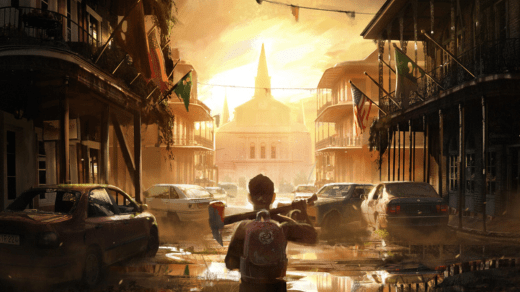The Walking Dead: Saints and Sinners is a virtual reality game set in the apocalyptic world of The Walking Dead universe. As players navigate through the gritty, zombie-infested streets of New Orleans, they encounter various factions vying for power and survival. But amidst the chaos, one question lingers: Where is the church?
1. The Absence of Sanctuary:
In a world overrun by the undead, the traditional notion of sanctuary in churches has been challenged. Players often wonder why the church, a symbol of hope and refuge, seems conspicuously absent in the game.
2. Shattered Faith:
The absence of churches highlights the theme of shattered faith in the face of a catastrophic event. Survivors must grapple with existential questions about religion and spirituality as they fight for survival.
3. Role of Religion:
While churches may be absent physically, the game subtly explores the role of religion in a post-apocalyptic society. Players encounter religious artifacts and symbols scattered throughout the game world, hinting at the enduring influence of faith.
4. Moral Dilemmas:
The absence of organized religion raises moral dilemmas for players. Without the guiding principles of traditional religious institutions, survivors must navigate ethical decisions on their own, often grappling with the blurred lines between right and wrong.
5. Search for Meaning:
In the absence of traditional religious structures, characters in the game search for meaning and purpose amidst the chaos. Players may find solace in forming their own beliefs or seeking connections with other survivors.
6. Emergence of New Belief Systems:
As traditional churches fade into obscurity, new belief systems emerge in their place. Players encounter cults and factions with their own ideologies, challenging traditional notions of spirituality.
7. Community Bonds:
In the absence of churches, survivors form tight-knit communities to support each other. These bonds serve as a replacement for the sense of belonging traditionally found in religious congregations.
8. Questioning Authority:
The absence of organized religion prompts players to question authority figures and traditional power structures. In a world where institutions have crumbled, survivors must decide whom to trust and follow.
9. Ethical Responsibility:
Without the guidance of religious teachings, players must confront their ethical responsibility to themselves and others. Every decision carries weight in a world where survival is paramount.
10. Symbolism of Ruins:
The crumbling ruins of churches serve as a powerful symbol of the collapse of civilization. Players confront the remnants of a world once governed by faith, now overrun by the undead.
11. Loss of Rituals:
In the absence of churches, survivors mourn the loss of familiar rituals and ceremonies. The lack of religious ceremonies highlights the profound changes wrought by the apocalypse.
12. Quest for Redemption:
Characters in the game grapple with their past sins and seek redemption in a world devoid of traditional religious absolution. The quest for redemption becomes a driving force for many survivors.
13. Reinterpretation of Scriptures:
Survivors may reinterpret religious scriptures to find meaning in their new reality. The absence of religious authority allows for diverse interpretations of faith and morality.
14. Spiritual Healing:
While churches may be absent, characters in the game seek spiritual healing through alternative means. Whether through personal reflection or connections with others, survivors find ways to cope with trauma.
15. Secular Sanctuaries:
In the absence of churches, survivors establish secular sanctuaries where they can find respite from the dangers of the outside world. These safe havens serve as beacons of hope in a dark and chaotic world.
16. Questioning Divine Intervention:
The absence of divine intervention in the face of the apocalypse prompts characters to question their beliefs about God’s role in the world. Survivors must reconcile their faith with the harsh realities they face.
17. Evolution of Belief:
As the game progresses, characters undergo an evolution of belief, adapting their faith to the challenges of their new reality. The absence of traditional religious institutions forces survivors to forge their own spiritual paths.
18. Legacy of the Past:
The absence of churches serves as a reminder of the legacy of the past. Players encounter remnants of a world that once was, prompting reflection on what has been lost in the wake of the apocalypse.
19. Unity in Diversity:
In the absence of religious institutions, survivors from diverse backgrounds come together to find common ground. The apocalypse erases traditional divides, fostering unity in the face of adversity.
20. Quest for Hope:
While churches may be absent, characters in the game embark on a quest for hope in a seemingly hopeless world. Through their actions and relationships, survivors find glimmers of optimism amidst the darkness.
21. Exploration of Existential Themes:
The absence of churches allows for the exploration of existential themes such as purpose, mortality, and the nature of humanity. Players confront these profound questions as they navigate the unforgiving world of Saints and Sinners.
22. Resilience in Adversity:
The absence of churches underscores the resilience of the human spirit in the face of adversity. Survivors find strength within themselves and their communities, refusing to succumb to despair.
23. Search for Meaningful Connections:
In the absence of traditional religious communities, survivors seek meaningful connections with others. These relationships provide solace and support in a world ravaged by death and destruction.
24. Hope for the Future:
While churches may be absent, the game offers hope for the future through the resilience and resourcefulness of its characters. Survivors band together to rebuild society, forging a new path forward.
25. The Quest Continues:
As players journey through the world of The Walking Dead: Saints and Sinners, the question of where the church is may remain unanswered. Yet, amidst the chaos and uncertainty, survivors persevere, driven by the hope of a better tomorrow.





